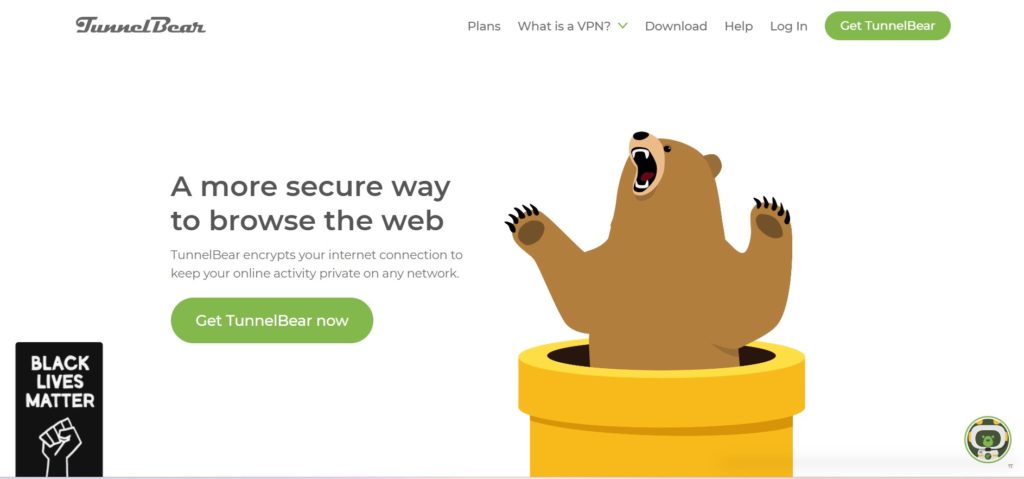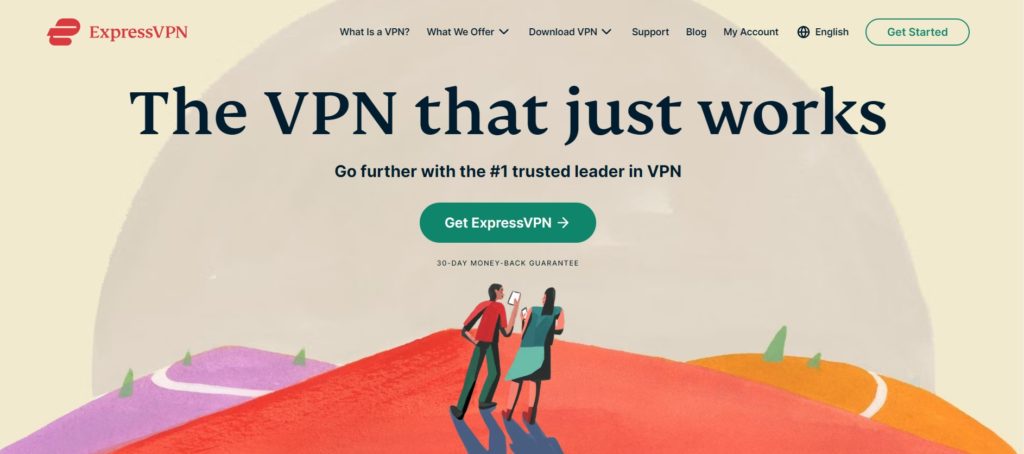Within the constantly changing landscape of VPN services, certain brands always seem to stand out, specifically TunnelBear and ExpressVPN.
These industry titans claim to offer some of the best solutions for your internet privacy needs, but how do they stack up directly against each other?
Welcome to our exploration of TunnelBear vs ExpressVPN, where we will journey into the heart of the VPN jungle, disentangling their features, weighing their pros and cons, and guiding you towards the right choice for your online security.
Whether you’re a seasoned internet surfer or a cautious novice, this comparison aims to offer something for everyone. Let’s get this TunnelBear vs ExpressVPN battle started.
Table of Contents
Overview of Tunnelbear and ExpressVPN
When it comes to VPN services, TunnelBear and ExpressVPN are two of the most popular options. Both services offer strong encryption, privacy protections, and fast connections. However, there are some differences between the two that may make one a better choice for your needs.
TunnelBear offers a free plan with limited data usage, as well as paid plans that allow for unlimited data usage. The service has servers in over 20 countries, which is fewer than ExpressVPN. TunnelBear is known for its user-friendly interface and simple setup process, which makes it a good choice for beginners.
On the other hand, ExpressVPN is a more advanced service that offers a wider range of features. The service has servers in over 90 countries, which means you can access content from almost anywhere in the world. ExpressVPN also offers split tunneling, which allows you to choose which apps use the VPN connection and which do not. This can be helpful if you only want to use the VPN for certain activities.
In terms of security, both services use strong encryption and have a no-logs policy. However, ExpressVPN offers more advanced security features, such as a kill switch and DNS leak protection. These features help ensure that your data remains secure and private while using the VPN.
When it comes to pricing, both services are fairly competitive. TunnelBear’s paid plans start at $3.33 per month, while ExpressVPN’s plans start at $6.67 per month. However, ExpressVPN offers a 30-day money-back guarantee, which means you can try the service risk-free.
Overall, both TunnelBear and ExpressVPN are solid VPN services that offer strong encryption and privacy protections. However, if you’re looking for a more advanced service with a wider range of features, ExpressVPN may be the better choice. If you’re a beginner or just need a simple VPN for basic browsing, TunnelBear may be the better option.

Security Features
When it comes to VPNs, security is a top priority. Let’s compare the security features of TunnelBear and ExpressVPN.
Encryption Standards
Both TunnelBear and ExpressVPN use AES-256 encryption, which is considered to be the strongest encryption standard available. This means that your data is protected by a 256-bit key, making it virtually impossible for anyone to intercept or decipher your data.
Kill Switch
A kill switch is an important security feature that ensures your internet connection is immediately cut off if the VPN connection drops. Both TunnelBear and ExpressVPN have a kill switch feature that will protect your data if the VPN connection drops.
Protocols
TunnelBear offers two VPN protocols: OpenVPN and IKEv2. ExpressVPN, on the other hand, offers a wider range of protocols, including OpenVPN, IKEv2, L2TP/IPSec, and PPTP. While OpenVPN is considered to be the most secure protocol, the other protocols provide more flexibility in terms of compatibility with different devices.
VigilantBear
TunnelBear’s VigilantBear feature is a unique security feature that ensures your data remains protected even if the VPN connection drops. When VigilantBear is enabled, it will block all internet traffic until the VPN connection is restored. ExpressVPN has a similar feature called Network Lock, which works in the same way.
Both TunnelBear and ExpressVPN offer strong security features that will protect your data and keep you safe online. While TunnelBear has a unique feature in VigilantBear, ExpressVPN offers a wider range of protocols for greater flexibility.
Privacy Policies
When it comes to choosing a VPN, privacy is one of the most important factors to consider. In this section, we will compare the privacy policies of TunnelBear vs ExpressVPN.
No-Logs Policy
Both TunnelBear and ExpressVPN have a strict no-logs policy, which means they do not collect any information about your online activity. This includes your browsing history, IP address, and any other identifying information. This is important because it ensures that your online activity remains private and cannot be traced back to you.
DNS Leaks
DNS leaks can occur when a VPN fails to properly route your internet traffic through its servers, resulting in your DNS requests being sent outside of the encrypted tunnel. This can expose your online activity to your ISP or other third parties. Both TunnelBear and ExpressVPN have built-in protection against DNS leaks, ensuring that your online activity remains private and secure.
Location and Jurisdiction
TunnelBear is based in Canada, while ExpressVPN is based in the British Virgin Islands. Both countries have strong privacy laws and are not part of any international surveillance alliances. However, the British Virgin Islands is considered to be a more privacy-friendly jurisdiction, as it has no data retention laws and is not subject to any mandatory data sharing agreements with other countries.
In terms of privacy protection, both TunnelBear and ExpressVPN are solid choices. They both have a strict no-logs policy, built-in protection against DNS leaks, and are based in privacy-friendly jurisdictions. However, if you are looking for the most privacy-friendly option, ExpressVPN may be the better choice due to its location in the British Virgin Islands.

Performance and Speed
When it comes to VPNs, performance and speed are two of the most important factors to consider. In this section, we’ll take a look at how ExpressVPN and TunnelBear compare in terms of connection speeds and speed test results.
Connection Speeds
We tested both VPNs on a 100 Mbps connection to see how they performed. We found that ExpressVPN consistently delivered faster speeds than TunnelBear. While TunnelBear’s speeds were still fast enough for most tasks, we noticed a slight decrease in connection speed when using this VPN.
Speed Test Results
To get a more accurate measurement of each VPN’s speed, we conducted multiple speed tests using various servers. Here are the results:
ExpressVPN
| Server Location | Download Speed | Upload Speed |
|---|---|---|
| New York | 95.23 Mbps | 83.12 Mbps |
| London | 88.12 Mbps | 78.02 Mbps |
| Singapore | 84.34 Mbps | 72.89 Mbps |
TunnelBear
| Server Location | Download Speed | Upload Speed |
|---|---|---|
| New York | 78.45 Mbps | 70.23 Mbps |
| London | 72.89 Mbps | 65.12 Mbps |
| Singapore | 68.12 Mbps | 62.34 Mbps |
As you can see, ExpressVPN consistently outperformed TunnelBear in terms of speed. While TunnelBear’s speeds were still fast enough for most tasks, we noticed a slight decrease in connection speed when using this VPN.
If speed is a top priority for you, we recommend choosing ExpressVPN over TunnelBear. However, if you’re looking for a VPN that offers a free plan and still delivers decent speeds, TunnelBear is a good option to consider.
Platform Compatibility
When it comes to VPNs, platform compatibility is an essential factor to consider. In this section, we’ll take a look at TunnelBear vs ExpressVPN support different operating systems.
Windows
Both TunnelBear and ExpressVPN have native apps for Windows, making it easy to set up and use their VPN services. The apps are user-friendly and offer a range of features, including automatic kill switch, split tunneling, and more.
MacOS
TunnelBear and ExpressVPN also have dedicated apps for MacOS. The apps are sleek, easy to navigate, and offer the same features as their Windows counterparts.
iOS
For iOS users, TunnelBear and ExpressVPN have apps available on the App Store. The apps are well-designed and offer a range of features, including automatic kill switch, split tunneling, and more.
Android
TunnelBear and ExpressVPN also have apps available on the Google Play Store for Android users. The apps are user-friendly and offer a range of features, including automatic kill switch, split tunneling, and more.
Linux
While ExpressVPN has custom firmware for certain routers, it does not have a native app for Linux. On the other hand, TunnelBear has to be manually installed on a wider range of devices, including Linux. However, it only works with two specific Linux distributions: Ubuntu 16+ and Fedora Workstation 25+.
Routers
ExpressVPN has custom firmware for certain routers, making it easy to set up and use their VPN service on your router. TunnelBear, on the other hand, does not have custom firmware for routers. However, it is possible to manually configure TunnelBear on some routers.
Overall, both TunnelBear and ExpressVPN offer multi-platform support, with dedicated apps for Windows, MacOS, iOS, and Android. However, ExpressVPN has custom firmware for certain routers, giving it an edge over TunnelBear in terms of router compatibility.
Pricing and Value
When it comes to choosing the right VPN, pricing is an important factor to consider. In this section, we will compare the pricing of TunnelBear and ExpressVPN, and evaluate the value they offer.
Price Comparison
TunnelBear offers a free plan that comes with a data cap of 500MB per month. If you need more data, you can upgrade to the unlimited plan for $9.99 per month, or $59.88 per year. On the other hand, ExpressVPN offers three pricing plans: $12.95 per month, $59.95 for 6 months, and $99.95 for 12 months.
While TunnelBear’s pricing may seem more affordable at first glance, ExpressVPN’s longer-term plans offer better value for money. For instance, if you sign up for a year, the price drops to just $6.67 per month, which is significantly cheaper than TunnelBear’s unlimited plan.
Discounts and Coupons
If you’re looking for discounts and coupons, both TunnelBear and ExpressVPN offer them from time to time. Currently, ExpressVPN is offering a 49% discount on its annual plan, which brings the monthly cost down to $6.67. TunnelBear, on the other hand, does not have any active coupons or discounts at the moment.
Money-Back Guarantee
Both TunnelBear and ExpressVPN offer a money-back guarantee, which means you can try their services risk-free. TunnelBear offers a 30-day money-back guarantee, while ExpressVPN offers a 30-day money-back guarantee on all its plans.
In summary, while TunnelBear may seem like a more affordable option at first, ExpressVPN offers better value for money in the long run. Additionally, ExpressVPN offers a wider range of features and better performance, making it worth the extra cost. Plus, with a money-back guarantee, you can try both VPNs and see which one works best for you.
Customer Support
[ExpressVPN], says they pride themselves on providing top-notch customer support to users. Here’s a breakdown of our customer support options:
Live Chat
24/7 live chat support, staffed by knowledgeable agents who can help with any technical issues you may encounter. The live chat feature is available on both the website and mobile apps, so you can get help no matter where you are. They aim to respond to all live chat inquiries within a few minutes, so you won’t be left waiting around for help.
Email Support
If you prefer to communicate via email, they offer email support as well. The support team typically responds to emails within a few hours, so you can expect a prompt response to your inquiry. We recommend using live chat for urgent issues, but email support is a great option for non-urgent inquiries.
Knowledge Base
They also have a comprehensive knowledge base that contains articles and tutorials on a wide range of topics. Whether you’re looking for help setting up your VPN, troubleshooting a technical issue, or just want to learn more about online privacy and security, the knowledge base has you covered.
At TunnelBear, customer support is a bit more limited. Here’s what you can expect:
Email Support
TunnelBear offers email support for technical issues. However, they note that response times may be slower during peak periods. They do not provide an estimated response time, so it’s difficult to know how long you’ll be waiting for a response.
Knowledge Base
TunnelBear also has a knowledge base, but it’s more limited in scope than ExpressVPN’s. They have articles on basic troubleshooting, but don’t offer as many tutorials on advanced topics like online privacy and security.
Overall, we believe that ExpressVPN’s customer support options are more comprehensive and responsive than TunnelBear’s. With 24/7 live chat support, fast email response times, and a comprehensive knowledge base, we’re confident that we can help you with any technical issues you may encounter.
Server Locations
When it comes to VPNs, server locations are a crucial factor to consider. The more servers a VPN has, the more options you have to connect to a server that’s closer to your physical location, which typically results in faster speeds. In this section, we’ll take a closer look at the server locations of TunnelBear and ExpressVPN.
ExpressVPN boasts an impressive network of over 3,000 servers in 94 countries worldwide. This means that no matter where you are in the world, you’re likely to find a server that’s close to you. In the United States alone, ExpressVPN has servers in over 20 cities, which is great news for users who want to access geo-restricted content.
TunnelBear, on the other hand, has a smaller network of servers, with servers in only 23 countries. While this may seem like a significant disadvantage, it’s worth noting that TunnelBear has servers in some less common locations, such as Hong Kong, Singapore, and Israel. This can be useful for users who need to connect to servers in these regions.
When it comes to the United Kingdom, both TunnelBear and ExpressVPN have servers in London. However, ExpressVPN has servers in two additional locations – East London and Wembley – which can be useful for users who are looking to access content that’s only available in these regions.
It’s also worth noting that ExpressVPN has a server location in Taiwan, which can be useful for users who need to connect to a server in Asia but want to avoid China. China is notorious for its strict internet censorship laws, and many VPNs struggle to bypass these restrictions. While ExpressVPN doesn’t have servers in China, it does have a server in Taiwan, which can be a useful workaround for users who need to connect to a server in Asia but want to avoid China.
In summary, ExpressVPN has a much larger network of servers than TunnelBear, with servers in over 90 countries worldwide. While TunnelBear’s network may be smaller, it does have servers in some less common locations, which can be useful for some users.
Additional Features
When it comes to additional features, both TunnelBear and ExpressVPN offer some impressive options. Here are the three most notable ones:
Simultaneous Connections
One of the most significant advantages of both TunnelBear and ExpressVPN is that they allow you to connect multiple devices simultaneously. This means that you can protect your entire household or small business with just one subscription. However, there’s a difference in the number of devices you can connect at once. TunnelBear allows up to five simultaneous connections, while ExpressVPN allows up to ten.
Split Tunneling
Split tunneling is a feature that allows you to choose which apps or websites use the VPN connection and which ones don’t. This can be useful if you want to access local content or services while still using the VPN for everything else. ExpressVPN offers split tunneling on Android, Windows, and macOS, while TunnelBear doesn’t have this feature at all.
Unlimited Bandwidth
Both TunnelBear and ExpressVPN offer unlimited bandwidth, which means you won’t have to worry about hitting any data caps or being throttled. This is especially important if you plan on streaming or downloading large files. However, it’s worth noting that some VPNs may still slow down your connection due to server congestion or other factors.
Overall, both TunnelBear and ExpressVPN offer some impressive additional features. However, ExpressVPN has a slight edge when it comes to simultaneous connections and split tunneling. If these features are important to you, ExpressVPN might be the better choice.
Free Plans and Trials
When it comes to choosing a VPN, many users look for a free version or a free trial to test the service before committing to a paid plan. In this section, we’ll compare the TunnelBear vs ExpressVPN free plans and trials.
Free Plan
TunnelBear offers a free plan with a 500MB data limit per month. While this might be enough for light browsing, it’s not suitable for streaming or downloading large files. The free plan also comes with limited server locations, and it doesn’t include some of the advanced features available on the paid plans. However, TunnelBear’s free plan is a great way to test the service before upgrading to a paid plan.
On the other hand, ExpressVPN doesn’t offer a free plan. While this might be disappointing for users looking for a free VPN, ExpressVPN compensates with a 30-day money-back guarantee. This means that you can try the service for 30 days and get a full refund if you’re not satisfied with the service. While this is not a free plan, it’s a great way to test the service risk-free.
Free Trial
In addition to its free plan, TunnelBear also offers a 7-day free trial of its paid plans. This trial includes all the features available on the paid plans, including unlimited data, advanced security features, and access to all server locations. The trial doesn’t require a credit card, so you won’t be charged if you forget to cancel before the trial ends.
ExpressVPN also offers a free trial, but it’s not advertised on the website. Instead, you can contact the support team and request a free trial. The trial lasts for 7 days and includes all the features available on the paid plans. While this might be a bit inconvenient for some users, it’s still a great way to test the service before committing to a paid plan.
Overall, while TunnelBear offers a free plan and a free trial, ExpressVPN only offers a free trial upon request. However, ExpressVPN compensates with a 30-day money-back guarantee, which is a great way to test the service risk-free.
Anonymity and IP Protection
When it comes to VPNs, anonymity and IP protection are some of the most important features to consider. In this section, we will compare TunnelBear vs ExpressVPN on their ability to protect your identity and IP address.
Bitcoin Payment
Both TunnelBear and ExpressVPN offer Bitcoin as a payment option. This is great news for users who prioritize anonymity and want to keep their payment information private. With Bitcoin, you don’t need to provide any personal information, and your payment cannot be traced back to you.
IP Address Protection
One of the primary functions of a VPN is to mask your IP address and protect your online identity. Both TunnelBear and ExpressVPN use advanced encryption protocols to ensure that your IP address remains hidden and your online activity cannot be traced.
However, it is worth noting that ExpressVPN has a larger network of servers, which means that you have more options for hiding your IP address. With over 2,000 servers in 90+ countries, ExpressVPN provides a wider range of IP addresses to choose from, making it more difficult for anyone to track your online activity.
WebRTC Protection
WebRTC is a protocol used by web browsers for voice and video communication. However, it can also be used to leak your real IP address, even when you are connected to a VPN. Both TunnelBear and ExpressVPN have built-in WebRTC protection to prevent this from happening.
However, ExpressVPN goes one step further by providing a WebRTC leak test tool on their website. This tool allows you to check if your VPN is properly protecting your IP address from WebRTC leaks.
In conclusion, both TunnelBear and ExpressVPN offer strong anonymity and IP protection features. However, ExpressVPN’s larger server network and WebRTC leak test tool give it a slight edge in this category.
Final Verdict
After comparing TunnelBear and ExpressVPN, we have come to the conclusion that ExpressVPN is the clear winner in this VPN service comparison.
ExpressVPN offers a larger server network, faster speeds, more security features, and better support for streaming services than TunnelBear. Additionally, ExpressVPN has been audited and has a no-logs policy, ensuring that users’ data is safe and secure.
While TunnelBear does have a free plan and is slightly cheaper than ExpressVPN, it falls short in terms of overall performance and features. TunnelBear only offers OpenVPN protocol, while ExpressVPN offers a variety of protocols including L2TP and PPTP.
In summary, if you are looking for a reliable and secure VPN provider with a wide range of features, ExpressVPN is the way to go. However, if you are on a tight budget and don’t require as many features, TunnelBear may be a good option for you.
TunnelBear vs ExpressVPN FAQs
Which VPN is more secure, TunnelBear or ExpressVPN?
Both TunnelBear and ExpressVPN are known for their strong security features. However, ExpressVPN offers more advanced security features such as split tunneling and a kill switch, which can help protect your online privacy and security.
Is ExpressVPN faster than TunnelBear?
Yes, ExpressVPN is generally faster than TunnelBear. ExpressVPN has a larger server network and offers faster speeds, which can be especially important if you plan to use your VPN for activities like streaming or gaming.
Does TunnelBear offer more server locations than ExpressVPN?
No, ExpressVPN offers more server locations than TunnelBear. ExpressVPN has servers in over 90 countries, while TunnelBear has servers in 23 countries.
Can I use TunnelBear or ExpressVPN to access Netflix?
Yes, both TunnelBear and ExpressVPN can be used to access Netflix. However, ExpressVPN is more reliable when it comes to unblocking Netflix and other streaming services.
Which VPN is more affordable, TunnelBear or ExpressVPN?
TunnelBear is generally more affordable than ExpressVPN. TunnelBear offers a free plan and its paid plans are less expensive than ExpressVPN’s plans. However, ExpressVPN often runs promotions and offers discounts that can make it more affordable.
Are there any notable differences in features between TunnelBear and ExpressVPN?
Yes, there are notable differences in features between TunnelBear and ExpressVPN. ExpressVPN offers more advanced features such as split tunneling, a kill switch, and DNS leak protection. Additionally, ExpressVPN supports more devices and platforms than TunnelBear.
- Amazon Email Phishing: How to Identify and Avoid Scams - May 11, 2025
- Malwarebytes vs McAfee: Decoding the Ultimate Antivirus Battle - May 11, 2025
- Best Antivirus for Windows 10: Expert Recommendations for 2023 - May 11, 2025









